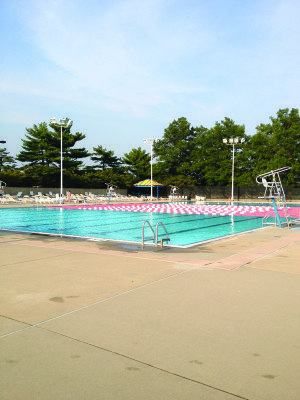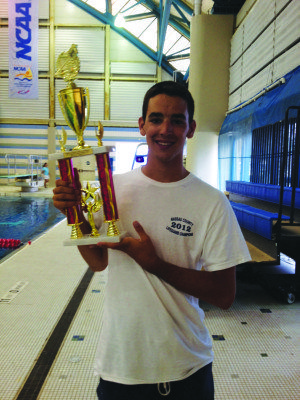 A day in the life of a lifeguard
A day in the life of a lifeguard
The smell of coconut sunblock, nautical blue and white stripes, flip-flops and colorful fruity drinks epitomize the start of summer. To Massapequa native Christopher Burke, the start of summer means one thing: saving lives.
The 21-year-old has a special relationship with water. An avid swimmer and surfer, Burke has also been a trained and certified lifeguard for the past five years.
“I wanted to become a lifeguard since I started going to the community pool as a child,” said Burke, who is a graduate of the State University of Albany. “Some of my coaches were lifeguards, and I thought that it would be a great way to use my love of swimming and training for this job.”
As part of the Jones Beach Junior Lifeguard program—which teaches young kids and teenagers how to train and perform beach lifeguard tasks—Burke, who swam competitively since he was 10, completed a rigorous training schedule in order to prepare him for the lifeguard hire test. He was required to swim a certain number of laps in a given period of time, which came easily to Burke as he was already an experienced swimmer.
 “We also had to learn all of the different types of skills that a lifeguard needed to know, such as water escapes, the different types of saves, water entries, how to rescue the victim depending on their injuries and needs and how to use the equipment in the water to make sure the victim is properly taken care of,” he said, adding that performing CPR/AED, as well as First Aid American Red Cross lifeguard and Nassau County lifeguard certification are mandated requirements. “At the end of the course, all of the lifeguards in training had to pass a physical and written test, which assesses our skill capability and knowledge of what to do in certain scenarios.”
“We also had to learn all of the different types of skills that a lifeguard needed to know, such as water escapes, the different types of saves, water entries, how to rescue the victim depending on their injuries and needs and how to use the equipment in the water to make sure the victim is properly taken care of,” he said, adding that performing CPR/AED, as well as First Aid American Red Cross lifeguard and Nassau County lifeguard certification are mandated requirements. “At the end of the course, all of the lifeguards in training had to pass a physical and written test, which assesses our skill capability and knowledge of what to do in certain scenarios.”
As a Nassau County lifeguard, Burke spent four years at Hicksville’s Cantiague Park pool before accepting a new position this summer. Currently one of several lifeguards inside Eisenhower Park’s Aquatic Center, his day starts bright and early at 9 a.m.
“I have to be in the stand at 10 a.m., and every day, I sit in a 20-minute rotation with the other lifeguards, which allows everyone to sit at each stand at least once a day,” he said. “Every hour, I get a 20-minute break in the lifeguard office where I normally eat, reapply sunscreen or just relax. I work until 6 p.m., five days a week like any other full-time job.”
Ever wonder why lifeguards carry around those whistles? Not just for a fashion statement, each whistle means a different signal. In an emergency save-and-rescue situation, all lifeguards must respond immediately, even those on break.
“When a lifeguard gets the attention of a patron they blow one whistle. If the lifeguard goes into the water to rescue a patron, they blow two hard, fast whistles,” said Burke. “To get the attention of a supervisor, the lifeguard will blow three short whistles. Finally, when a lifeguard blows four short, hard, fast, loud whistles, that means that a patron has to be backboarded because they either hurt their back or neck and first responders need to be called.”
 Aside from his essential whistle, Burke’s most important item to have with him is his first aid kit. He also needs water, a lifeguard buoy, sunglasses and an umbrella. He is also responsible for placing all of the backboards in an easily accessible area. But as he explained, there are many differences between being a beach lifeguard and a pool lifeguard.
Aside from his essential whistle, Burke’s most important item to have with him is his first aid kit. He also needs water, a lifeguard buoy, sunglasses and an umbrella. He is also responsible for placing all of the backboards in an easily accessible area. But as he explained, there are many differences between being a beach lifeguard and a pool lifeguard.
“In a pool, you are confined to only one area that you have to watch at a time, while at the beach, you have the entire ocean,” said Burke, who added that beach lifeguards require a specific level of vision to even be considered. ”Being a beach lifeguard also requires knowledge of the ocean, but the most important characteristics that all lifeguards should possess is confidence, focus and patience.”
Burke considers himself a good lifeguard and credits his passion for swimming and experience in the water, but knowing he is a role model to younger kids makes his job more rewarding.
“As a little kid, I remember how I looked up to a coach of mine and admired him for being able to save people,” said Burke. “At times, it can be a very busy, stressful day, but I find that to be exciting because I want to focus my career on crisis management, and the fast-paced pressure world of lifeguarding prepares me for my future.”
Burke recalled a time when he rescued an adult who then returned the pool the next summer telling Burke that he had learned how to swim.
“Ever since I rescued him, he learned to swim and enrolled his children in swim lessons. My actions at work changed this man’s life, and that is a really good feeling,” he said. “I save about four to five people every season.”
Last summer while on vacation in Westhampton, Burke rushed to the aid of a middle-aged woman.
“She was yelling for help because she couldn’t get back in and said she was so tired that she couldn’t swim anymore,” said Burke of the rescue. “I was lucky to be in the right place at the right time, but it just goes to show that your skills and training are always with you, and you never know when you might need them.”



















